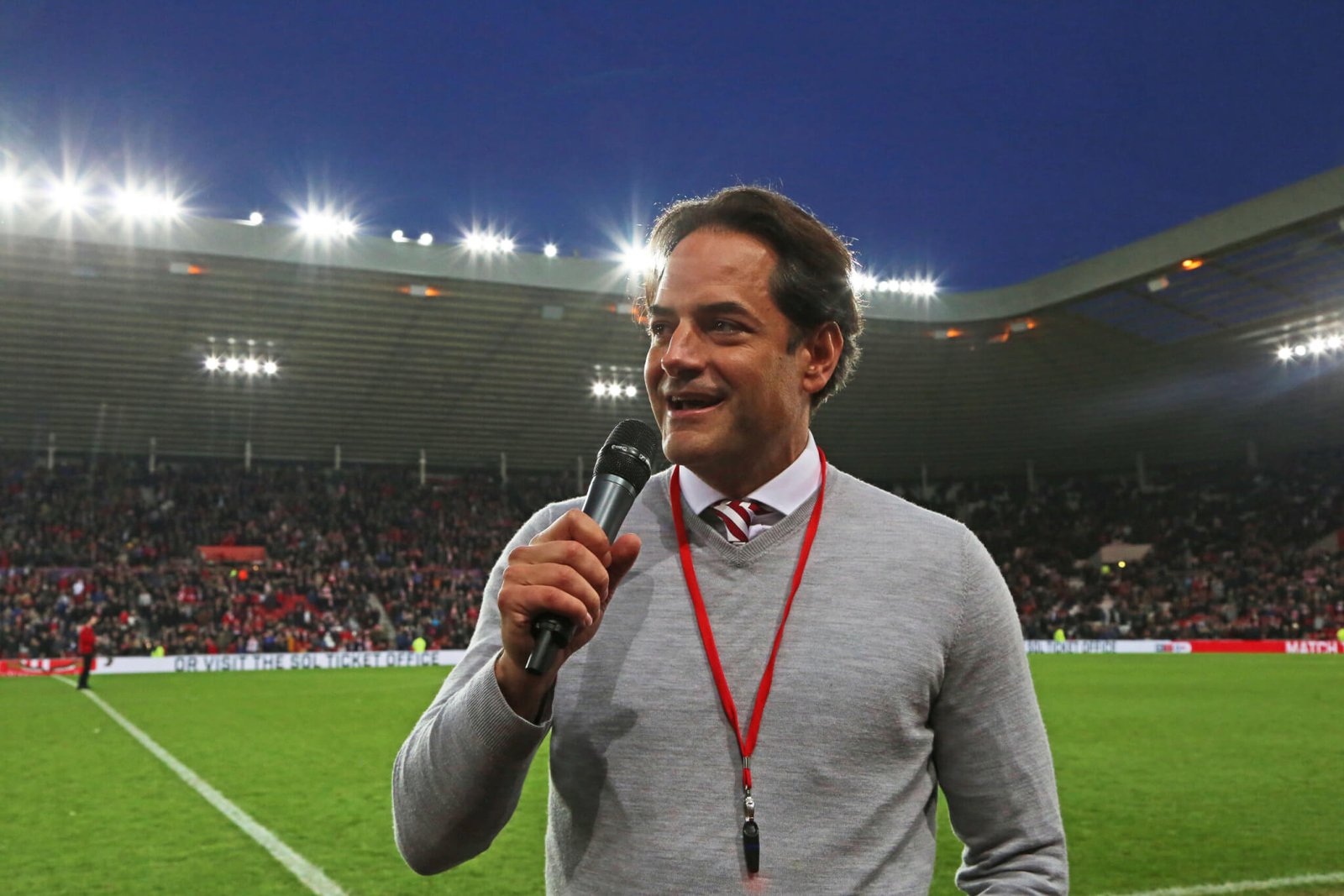It was in the minutes counting down to Sunderland’s promotion out of League One in May 2022 that Ben Turner and his brother Gabe made up their minds as they sat in the stands at Wembley.
Their successful Netflix documentary show Sunderland ’Til I Die had been boxed up and put away when series two concluded with tears and defeat in that same League One play-off final three years earlier, but in seeing the team end that awkward wait for a return to the Championship, there was clarity.
“We had the chance just to show how magical it can be,” says Turner, a lifelong Sunderland fan and founder of Fulwell73, the production company behind the hit series.
“Wembley was so special. I was there with my brother and I remember being overcome with emotion. It felt like we had to give that to people. We had to put Sunderland back out there. It was phenomenal.”
That 2-0 victory over Wycombe Wanderers was the catalyst to revive Sunderland ’Til I Die and forms the central thread of a new series released on Tuesday. After all the sorrow of series one and two comes joy in three.
This will almost certainly be the full stop on a show first released in December 2018. Two of the most miserable years in Sunderland’s history were previously captured in all their gruesome detail, first with a fall out of the Championship under Simon Grayson, Chris Coleman and twice caretaker boss Robbie Stockdale (the club’s second relegation in as many seasons), and then with the chance to immediately bounce back fluffed in the third tier under Jack Ross. ’
This final series, albeit it is limited to three episodes compared to the eight and then six in the previous ones, brings more light and shade but retains the outlook that is key to the popularity of Sunderland ’Til I Die.
Familiar faces including taxi driver Peter Farrer and the often teary Michelle Barraclough are back to narrate progress and anchor the club’s place in a working-class city on England’s north-east coast.
“As Sunderland fans, we’ve learned to enjoy football beyond success on the pitch,” says Turner, the programme’s executive producer. “The All Or Nothing series (distributed by Amazon and following the likes of Juventus, Manchester City, Arsenal and Tottenham Hotspur) are fixated on what success is going to look like but we were more focused on what football meant to its community around it.
“The Godfather is a film about the mafia, but it’s (also) a film about family.
Sunderland’s 2022 League One play-off final win will feature (Sunderland AFC via Getty Images)
“We’ve always been keen on what the resonance of a story is going to be, and obviously Sunderland was so dear to our hearts that it was clear it was about community. Because we’ve been so crap at football, it made us look at what else it means. And we were lucky enough to find a deep well to draw from.”
Sunderland will look a very different club in series three.
The old regime from series two, including Stewart Donald and Charlie Methven, has been replaced by Kyril Louis-Dreyfus, the young Swiss-born heir to a billionaire’s fortune. The new owner’s backstory, growing up as the son of the late former Marseille owner Robert Louis-Dreyfus, is included, as are those of the players who helped drag Sunderland out of League One after four years of trying.
That same young group came within a whisker of reaching Wembley again in the Championship play-offs last season only to lose 3-2 on aggregate to eventually-promoted Luton Town in the semi-finals, and in this one, they are putting together another tilt at the top six, Sunderland are sixth after a 3-1 home win against Plymouth Argyle yesterday, while placing the emphasis coldly on financial sustainability.
“It’s a million miles from the club we first started following,” Turner says. “The defining thing is that they’ve now got a plan. When we first met Martin Bain (Sunderland’s then chief executive), you could see he was just trying to keep the ship afloat.
“I know he’s unpopular with Sunderland fans but behind the scenes, you could see what he was up against. (Then owner) Ellis Short had more or less given up, so Bain was there waiting for the next crisis to happen.
“Fast forward to now, and I know we all have worries if this is the right plan for the club, but you can at least see what they’re trying to do. It might be the wrong plan, but at least they’ve got a sense of what they need to do to make it successful. That makes me willing to stay patient.”
#SunderlandTilIDie Season Three – Official Trailer
Coming 13 February on @NetflixUK 🎬 pic.twitter.com/2cOUGfdwUp
— Sunderland AFC (@SunderlandAFC) February 9, 2024
Sunderland ’Til I Die was always a bucket-list item for Ben. He, brother Gabe and second cousin Leo Pearlman, who now sits on Sunderland’s board of directors, grew up in London, a five-hour drive from Wearside, supporting the club their grandparents followed. Fulwell73, the production company they formed in 2005, takes its name from one end of Roker Park, Sunderland’s home stadium from 1898 to 1997, and the year of the club’s most recent FA Cup final win.
They made football documentaries including In The Hands Of The Gods and The Class Of ’92 before finally getting their foot in the door at the Stadium of Light, the club’s ground since 1997, in time for the 2017-18 season.
“We’d been trying to make something, pitching the club ever since we started,” says Turner. “For years, they wouldn’t let us anywhere near it but as our stock as documentary makers rose, we got a bit closer and closer.

Former co-owner Charlie Methven featured heavily in series two (Ian Horrocks/Sunderland AFC via Getty Images)
“Netflix were looking for a Premier League club initially and we’d said to them they didn’t want a club in the middle of the league because, for most of the season, the story will be quite boring.
“We said that Sunderland might not be very good on the pitch but they’re one of the great clubs for story and drama. Then we got relegated and then I’m telling Netflix on a call that they’ll not believe how great the story of promotion will be — we’d always get straight back out of the Championship for years. Of course, it went the other way.”
And how. Twelve months after finishing bottom of the Premier League, Sunderland finished bottom of the Championship with just 37 points from the 46 games and were relegated again.
“One of the show’s strengths was that we were free to tell the story we wanted to tell as we saw it,” Turner says. “Access typically comes with a lot of caveats, but there was a sense that because we were Sunderland fans long before any of the owners had come along, it fireproofed the access.

The team from Fulwell73, the company which makes Sunderland ‘Til I Die. Ben Turner is second right (Fulwell73)
“There were lots of people unhappy at various points with us being around. It was a struggle to begin with, and that’s understandable when you’re under massive pressure. You’re having a terrible day and everything is going wrong — the last thing you want is to be filmed. But it was unscripted TV.”
There were countless moments that made viewers shudder. Like an expensive, reckless deadline-day pursuit of Will Grigg, a prolific lower-divisions forward who would score just five league goals in two and a half years at the club, in the second series and the awkwardness of former England international Jack Rodwell refusing to scrap his lucrative contract in series one. Those were dovetailed with the authentic emotions, good and bad, of supporters.
U.S. actor and writer Rob McElhenney credits watching Sunderland ’Til I Die as the reason he is the co-owner of Wrexham alongside fellow Hollywood star Ryan Reynolds, and their documentary series following the now League Two club, Welcome To Wrexham, last month won five Emmys — the American TV equivalent of an Oscar.

Sunderland are chasing Championship promotion again this season (Ian Horrocks/Sunderland AFC via Getty Images)
That underlines the appeal of sports documentaries, which continues to grow. Filming has already begun for a third series of Welcome To Wrexham, just as it has on a production that will follow Jurgen Klopp’s final months as Liverpool manager. The broadcast rights for that are set to make Liverpool in excess of £10million.
“Sports documentaries work brilliantly because they’re a natural format,” says Turner. “They’re going to play a game every week and the characters are going to either succeed or fail. And then you’ll do that 40 to 50 times in a season. It’s very conducive to good storytelling. Documentaries used to be a bit like homework to people, but they’ve become entertainment in the last decade.
“People like football all around the world, so if you get it right, you’re guaranteed a global audience. And they tend to turn out reasonably well, because s**t will always happen.
“The best ones are about plot and character. You could have very little happening but if you’ve got an amazing character or plot, then it can sustain it. We were lucky with Sunderland ’Til I Die that we always had both.”
(Top photo: Eddie Keogh/Getty Images)
Read the full article here


